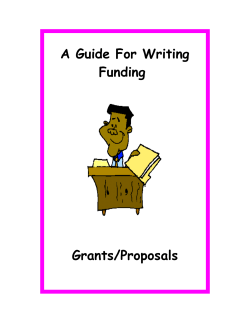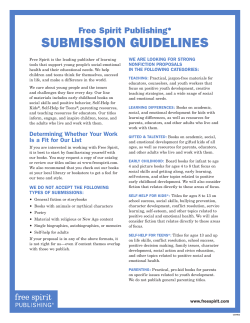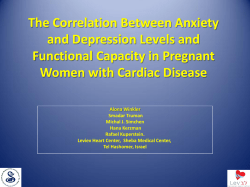
the Bibliotherapeutic Maze: ted altar, ph.d., r. psych.
BC Psychologist 17 The Bibliotherapeutic Maze: How to Pick a Book for Client Home Exercises t ed altar , ph . d., r . p s ych . The President of the BC Psychological Association. Contact for the Board of Directors at board@psychologists.bc.ca Be careful about reading health books. You may die of a misprint. — Mark Twain and Roman Stoic philosophers like Epictetus. William James was one of the first Philosopher/Psychologists to offer practical self-help in his published lectures to teachers and he selection of a good client students on psychology (James, 1899). self-help book or workbook is Another book that became popular now both easier with internet and also came from the Psychological and also more difficult given the community was Karl Menninger's proliferation of titles now available. Although most are probably worthless, book, “The human mind” published in 1945 that was perhaps one of the the American Psychological first more respectable books from the Association (Jacobs, 2009) estimated Psychological community at the time that some 2000 self-help books to have been popular for dealing with each year are published! Indeed, emotional problems. there is a pseudo psychology or pop The attraction to the public of psychology genre of books written self-prescribed and self-administered by those of doubtful credentials, as help has probably never been greater for example the books of marriage in what Philip Rief criticized as the guru John Gray, PhD, which are to “triumph of the therapeutic” in modern be viewed with scepticism since his society: Whatever the unique social PhD was via correspondence through conditions for this hunger for self“Columbia Pacific U” (an unaccredited improvement and personal meaning, institution closed down in 2000 by the more sound self-help books, as Court order). Other pop psychology opposed to pop-psychology books of books flatter with empty promises psychobabble, do address in a practical of hidden potentials, beguile with manner some very real problems shallow bromides and banalities, or for suffering individuals. The better even promote advice that is outright genre of self-help has evolved to now harmful. include respectable self-help manuals In spite of the proliferation which can be a great adjunct for of humbuggery, there are some very psychological treatment. One survey good and helpful self-help books. In fact, self-help books have been popular indicated that 85% of psychologists have reported recommending a selffor two centuries and available for help book to some of their clients a much longer period starting with (Norcross et al., 2000). Indeed, the the literature of the ancient Greek T proper client treatment manual can be a substantial cost benefit to clients who cannot afford to see a Psychologist as frequently as recommended. The advantages of having clients work on their problems outside of their therapy sessions in their real life settings would seem to be selfevident. There is unfortunately a lack of research on the therapeutic efficacy of particular materials although there are some exceptions like David Burns' Feeling Good Handbook. Metaanalysis of the studies that have been conducted on a few books has shown bibliotherapy to be effective with effect sizes ranging from 0.5 to 1.1 (Richard, E., 2008). Nevertheless, we need to keep in mind that not all clients are amenable to having an additional burden of “homework,” and choosing the right book for a particular client can be daunting. Many clients suffer from negative self-attitudes and such clients can conceivably be made to feel worse by particular statements in a book that they read when the Psychologist is not present to correct or explain. A depressed client may feel even more depressed if he or she doesn't complete the “homework” and have to report the failure to the therapist at the next session. Clearly, how one presents the option of some homework is important and it is probably best not to call it homework 18 Spring 2013 but use some other term like “exercises” more reliable method is to depend on or “helpful readings” that a client may the opinion of trusted colleagues or wish to try out but not feel obliged to accept the word of a general survey of complete. Whether one assigns the many psychologists like that found in whole book or a specific chapter each Narcross (2003) who surveyed some week seems to make no difference 3500 psychologists for their personal (Carlbring, 2011). ratings of self-help books. The question becomes Of course, our scientific which ones to recommend and by training demands that we seek what criteria. Obviously you cannot evidence for the bibliotherapeutic depend on book covers or even a materials we may want to use and quick skimming of the book, not if indeed there are some efficacy you want to avoid books that could studies on a few books for depression be potentially harmful or employ (Songprakun, 2012) and anxiety. disreputable methods and half-baked, There are even some recent studies pretentious advice. We now know on problems like occupational stress that thought stopping and distraction (Kilfedder, 2010), child sexual abuse techniques for certain problems have (Ginns-Gruenberg, 2012), hoarding been shown to be ineffective and (Muroff, 2012), low sexual desire may even make symptoms worse (Mintz, 2012). tinnitus distress (Richards & Farrand, 2010). Given (Malouff, 2010), and community the plethora of materials to choose psychology applications such as ACT from, what are we to do? Maybe a for grade twelve students (Jeffcoat, 2012). Unfortunately, studies of efficacy are too few and far between. A final method would be to rely on the systematic and considered judgement of experts in the speciality of concern. For example, Richard Redding and colleagues (2008) actually reviewed and rated 50 of the top best selling self-help books for depression, anxiety and trauma related disorders. The four expert psychologists prominent in their respective fields served as raters, used a consistent inter-judge rating scale, checked for consistency and rank ordered the fifty books in terms of depending on psychological science, stating reasonable expectations, providing general guidance and being useful overall, and hopefully providing some warning of possible iatrogenic effects. In table 1 are the top 10 from that list. Publication Information and Total Quality Score of Books Ranking/Book title/Primary author/Year/Publisher/Total quality score rank Author, (date), Title, Publisher Score* 1 Hyman, B.M. (1999). The OCD Workbook. New Harbinger 94 2 Markway, B. (1992). Dying of Embarrassment. New Harbinger 92 3 Antony, M. M. (2000). The Shyness & Social Anxiety Workbook New Harbinger 92 4 Neziroglu, F. (2004). Overcoming Compulsive Hoarding. New Harbinger 90 5 Foa, E. B. (2001). Stop Obsessing. Bantam Books 90 6 Prentiss, P. (2004). The Cyclothymia Workbook. New Harbinger 88 7 Castle, L. R. (2003). Bipolar Disorder Demystified. Marlowe 84 8 Burns, D. D. (2000). Feeling Good. Avon Books 83 9 Hyman, B. M. (2004). Overcoming Compulsive Checking New Harbinger 82 10 Penzel, F. (2000). Obsessive-Compulsive Disorders Oxford University Press 81 *The last number is the over-all score based on whether the book was based on sound science, provides specific guidance, realistic expectations, warnings of potential iatrogenic effects and overall usefulness. BC Psychologist With respect to the above list, I personally use Burn's Feeling Good Handbook (1999) for some of my clients suffering depression and or anxiety since it is a better buy for clients, with more coverage and more useful tools and exercises for clients to utilize. Of course, caveat emptor here applies as for example, Redding et al (ibid) found that of the 50 popular self-help books they reviewed, at least 18% could be deemed potentially iatrogenic! Other books may not be iatrogenic but would be of unproven worth and may be useless. Also, not all populations of clients, such as the subthreshold depressed elderly (Joling, 2011), will necessarily benefit from bibliotherapy. It is to be noted that the best rated books, like the ones listed above, were books addressing a specific problem written by professionals with a doctoral degree that advocate cognitive behavioural interventions. In the end, whatever means you employ to find and select bibliotherapeutic materials, professional psychologists are responsible for what they recommend to their clients. The man who does not read good books has no advantage over the man who can't read them. — Mark Twain references Carlbring, Per Maurin (2011). All at once or one at a time? A randomized controlled trial comparing two ways to deliver bibliotherapy for panic disorder.; Cognitive Behaviour Therapy, Vol 40(3), Sep, 2011. pp. 228–235. Ginns-Gruenberg, D. (2012) Effectively incorporating bibliotherapy into treatment for child sexual abuse. In the Handbook of child sexual abuse: Identification, assessment, and treatment. Goodyear-Brown, Paris (Ed.); pp. 377–398. John Wiley & Sons Inc. Jacobs, N. (2009). Bibliotherapy utilizing CBT.; In: General principles and empirically supported techniques of cognitive behavior therapy. Ed by O'Donohue, W. et al. John Wiley & Sons Inc, pp. 158–165. James, William (1899). Talks to Teachers on Psychology: and to Students on Some of Life's Ideals. Dover Publications 2001. Jeffcoat, T. & Hayes, S. (teven C2012). A randomized trial of ACT bibliotherapy on the mental health of K-12 teachers and staff. Behaviour Research and Therapy, Vol 50(9), Sep,. pp. 571– 579. Joling, K., et al. (2011). How effective is bibliotherapy for very old adults with subthreshold depression? A randomized controlled trial. The Amer. J. of Geriatric Psychiatry, Vol 19(3), Mar, 2011. pp. 256 –265. Kilfedder, C. et al. (2010). A randomized trial of face-to-face counselling versus telephone counselling versus bibliotherapy for occupational stress.; Psych. & Psychotherapy: Theory, Res. & Pract., v. 83, pp. 223–242. Malouff, J. et al. (2010). The effectiveness of bibliotherapy in alleviating tinnitus related distress. Journal of Psychosomatic Research, Vol 68(3), p. 245–251. Mintz, Laurie B. Balzer, Alexandra M. Zhao, Xinting Bush, Hannah E.; (2012). Bibliotherapy for low sexual desire: Evidence for effectiveness. Journal of Counseling Psychology, Vol 59(3),. pp. 471–478. Muroff, J. et al. (2012). Group cognitive and behavioral therapy and bibliotherapy for hoarding: A pilot trial. Depression and Anxiety, Vol 29(7), Jul, 2012. pp. 597– 604. Norcross, J. et al. (2003). Authoritative guide to self-help resources in mental health (2nd ed.). N.Y.: Guilford Pr. Redding, R., Herbert, J., & Forman, E. (2008). Popular self-help books for anxiety, depression, and trauma: How scientifically grounded and useful are they? Professional Pschology, Res. & Practice. v. 39(5), pp. 537-45. Richard E., James D. Herbert and Evan M. Forman(2008). Popular Self-Help Books for Anxiety, Depression, and Trauma: How Scientifically Grounded and Useful Are They? Professional Psychology: Research and Practice, Vol. 39, No. 5, 537– 545 Richardson, R.,l Richards, D., & Barkham, M. (2010). Self-help books for people with depression: The role of the therapeutic relationship. Behavioural and Cognitive Psychotherapy, Vol 38(1), 67– 87. Richards, D. & Farrand, P. (2010). Choosing self-help books wisely: Sorting the wheat from the chaff.Detail; In: Oxford guide to low intensity CBT interventions. Bennett-Levy, James (Ed.) et al. Oxford University Press, pp. 201–207. Rief, Philip (1966). The Triumph of the Therapeutic: Uses of Faith after Freud. Haper Torchbooks. Songprakun, Wallapa et al. (2012). Evaluation of a bibliotherapy manual for reducing psychological distress in people with depression: A randomized controlled trial. Journal of Advanced Nursing, Vol 68(12),. pp. 2674–2684. 19
© Copyright 2025


















